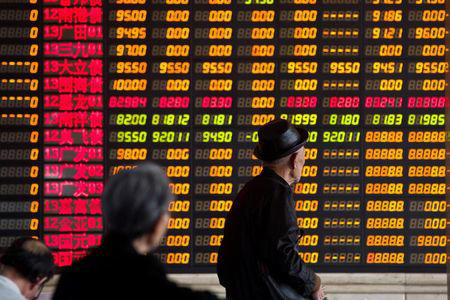On Tuesday, most Asian stock markets experienced a rebound, driven by a revival in heavyweight technology shares that had suffered recent declines. This positive movement in regional markets was fueled by a robust performance on Wall Street, where major tech stocks saw a significant resurgence. Investors are now looking ahead to quarterly earnings reports from major technology firms such as Alphabet and Tesla, scheduled to be released later in the day. These reports are expected to provide further insights into the health of the tech sector and influence market trends.
Regional Market Movements
In Japan, the Nikkei 225 index saw a modest increase of 0.2%, while the broader TOPIX index rose by 0.5%. This upward movement was primarily driven by a rebound in technology stocks, particularly those linked to the semiconductor industry. Notably, shares of Taiwan Semiconductor Manufacturing Company (TSMC), the world’s largest contract chipmaker, surged by 2.7% following a significant decline of nearly 7% over the past five trading sessions. The rebound in TSMC’s stock was seen as a positive indicator for the broader tech sector, even though the company’s positive second-quarter earnings had previously failed to prevent the decline.
South Korea’s KOSPI index also saw gains, rising by 0.3%. This uptick was supported by data showing a slight increase in factory inflation, as evidenced by the producer price index for June. The data suggested some stabilization in industrial prices, which may be contributing to a more optimistic economic outlook in South Korea.
Challenges and Sentiment
Despite these positive movements, the broader tech-heavy indexes in Asia have been struggling with significant declines over the past week. This weakness reflects a broader shift in investor sentiment as the market adjusts to expectations of interest rate cuts and potential economic recovery. Investors are increasingly rotating into sectors that are perceived as more likely to benefit from an economic upturn, leading to reduced focus on the technology sector despite its recent rebound.
In Australia, the ASX 200 index climbed by 0.7%, buoyed by strong performances from major banks and mining stocks. The gains in the Australian market underscore a broader rotation into economically sensitive sectors, as investors seek opportunities in areas that are expected to benefit from an anticipated economic recovery.
Futures for India’s Nifty 50 index pointed to a slightly positive open, supported by a weak rupee and continued optimism about the Indian economy. The BSE Sensex 30, along with the Nifty 50, remains near record highs. However, there is anticipation of potential volatility in local markets as the Indian government prepares to unveil its 2024 budget later in the day. This budget is expected to have significant implications for the country’s economic policies and market conditions.
Chinese Market Lag
In stark contrast to the broader regional gains, Chinese markets struggled significantly. The Shanghai Shenzhen CSI 300 and the Shanghai Composite indexes fell by 0.8% and 0.5%, respectively, while the tech-heavy Hang Seng index dropped by 0.3%. Despite a surprise interest rate cut by the People’s Bank of China on Monday, the market sentiment towards China remained largely negative. Analysts have argued that the rate cut, while unexpected, was too modest to effect substantial improvements in market conditions.
Investor disappointment was compounded by the Third Plenary Session of the Chinese Communist Party, which revealed few concrete details about future economic stimulus measures. This lack of clarity and specificity has left investors feeling uncertain about the prospects for additional support from Beijing.
Additionally, speculation regarding a potential Trump presidency continues to weigh heavily on Chinese markets. Donald Trump’s previously stated hardline stance towards China, including the possibility of imposing additional trade restrictions, has increased fears of escalating economic tensions between the two countries. This uncertainty about future U.S.-China relations is a significant factor contributing to the ongoing challenges faced by Chinese equities.
Conclusion
While most Asian stock markets outside China experienced a rebound, driven by a recovery in technology stocks and a positive start to the week on Wall Street, Chinese markets have remained under pressure. The combination of economic uncertainty, insufficient stimulus measures, and concerns about future U.S.-China trade relations has created a challenging environment for Chinese equities. As global investors continue to navigate these complex dynamics, attention will remain focused on upcoming earnings reports, economic data releases, and political developments that could further influence market trends and investor sentiment.
